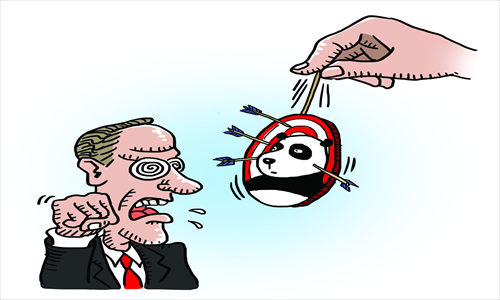China-bashing ads distract from real issues

As the US presidential election is entering its final phase, the campaign machines of Mitt Romney and Barack Obama are shooting at each other, day in and day out, with endless "China-cheating" commercials and chest-beating, flag-waving pledges.
China bashing is not new during the four-year presidential cycle. Two decades ago, challenger Bill Clinton accused the incumbent George H.W. Bush of "kowtowing to butchers from Baghdad to Beijing." In 2000, George W. Bush vowed to turn China from "a strategic partner" into a "strategic opponent." Both abandoned their campaign rhetoric after the election.
The ubiquitous China-bashing negative ads on the US airwaves in the current election year, however, are of a different breed.
At a minimum, this new "cheater" China is redirecting Americans' frustration away from the real source of their predicaments, Wall Street. The greed, dishonesty and "smart banking" by those unregulated "free market" bankers were directly responsible for the loss of $12.8 trillion of the global financial market.
Cheating occurs everywhere. Few, if any, believed all of Harvard cheats when dozens of its students were recently found to be academically dishonest. A blanket profiling of a nation of 1.3 billion people as "cheaters," however, is both shocking and strange.
The last time the US branded a nation as a "cheater" was December 7, 1941, when the Japanese ambassador delivered the declaration of war a day after Pearl Harbor was attacked.
The daily bombardment of China, and Chinese, as cheaters, liars, and occasionally, spies in the US 24/7 media also brings back some long-held prejudices against millions of Chinese Americans. Some 130 years ago, the notorious Chinese Exclusion Act, which stayed on the books until 1943, singled out the Chinese as the only ethnic group to suffer almost total restriction on immigration and naturalization.
Beyond this, one really needs to understand how the US could be "cheated" into the burgeoning bilateral ties with China in almost every category, including allowing this "cheater" to hold $1.2 trillion in US Treasury bills which actually helps sustain the US economy and even its military operations around the world.
Three decades after China started its economic reform, the world's most populous nation has joined the international trading system, not because it cheats, but because of the hard work of the Chinese people, who believe in the concept of a long-term cooperative relationship with the US, rather than hit-and-run profiteering.
The China-cheating frenzy in the US, along with the slew of other negative ads, did take a 24-hour break during the annual 9/11 anniversary. Obviously, flimsy and overly politicized finger-pointing was not appropriate for such a solemn occasion.
The question remains, though, as to why the living deserve to be given half-truths, misinformation and distorted images.
That said, those tasteless yet expensive negative ads will disappear after the election. Whoever is in the White House will soon find that campaign talks may or may not help him fix the US problems, which have been in the making for decades. Instead of blaming others, perhaps it is time for the US to learn from the rest of the world.
A US without over-lobbied politics, over-paid CEOs, over-crowded jails, over-drugged and over-armed citizens will be more attractive to others, including the Chinese. A society that consumes 25 percent of the world's energy with less than 5 percent of the world's population is not a model for others.
Statesmen lead with vision and vigor; politicians indulge in cheap talk while accomplishing little. Ultimately, it is up to the Americans to decide in November the final outcome of the current race to the White House.
The rest of the world, however, should also be concerned about the political process in the world's most powerful nation for one simple reason: They will be on the receiving end of US policies, be they good will, assistance, sanctions or bombs.
The author is a senior fellow at the Shanghai Association of American Studies. opinion@globaltimes.com.cn